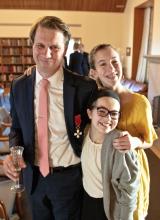Taking a look back at 2019, it has been full of achievement and excitement. We are delighted to welcome new faculty members this fall -- Lecturer in Lithuanian Eglė Vaisėtaitė and Instructor in Norwegian Dr. Andy Meyer. Our language classes increased in enrollment this fall, reversing a downward trend. And our projects are enjoying increasing popularity and recognition with awards.
Eglė comes to us from Vilnius University, where her work has focused on Lithuanian as a second language. We are delighted to welcome Eglė, whose position is paid for by the Lithuanian government and the UW in a cooperative agreement.
Andy’s position is supported by endowments intended to advance the study of Norwegian at the UW. Andy was a Fulbright teaching fellow in Norway, as well as earning a Ph.D. in English, with a specialty in literature and the environment, especially the Arctic.
The skill and energy our language instructors bring to their teaching is attracting students. This fall, our language enrollments reversed a ten-year decline in enrollments, ticking up some 15 percent during fall quarter. A reputation for excellent, approachable instructors attracts students. We continue to tell students about our courses and welcome them to the department. We also changed the coding of the courses in the course registration system, making them more visible to students.
Last year we started the Scandinavian 30 lecture series in partnership with the National Nordic Museum. The series has been a big success. The lectures are on the second Thursday of the month at 7PM in the Osberg Hall of the museum. They are free. They’re 30 minutes or less. They been amazing! The lectures have been sponsored by our advisory board members. We are so grateful for their generosity!
Be sure to RSVP. The Scandinavian 30 series is attracting 200-300 people for each talk.
Each of this fall's lectures looked into the future.
We began the year with Professor Marianne Stecher taking us to look at Hans Christian Andersen’s view of the future -- his science fiction. He imagined flying machines. Marianne used UW archival material on Andersen to shed light on the Dane's writings, deftly engaging the audience with her trademark wit.
In November, we heard UW Professor of Atmospheric Sciences David Battisti on "Impact of Climate Change on the Trolls of Norway.” He used real climate modeling to talk about the species of trolls discussed in the Norwegian (mock)umentary Trolljägaren (Troll Hunter, 2010). A riveting and humorous but scary lecture!
In December, Scandinavian Studies lecturer Lauren Poyer talked about Ragnarök, the Viking Y2K or doomsday future, as she put it. Lauren’s talk was learned, fascinating, and hilarious.
Please join us for more Scandinavian 30 talks in 2020: Kristian Næsby on hygge in Februrary, Ilona Härmävaara on Tom of Finland in March, Ellen Rees on the horror of Norwegian cabins in April, and Guntis Smidchens on folk wisdom of the North in May.
Scandinavian 30 reflects the many popular courses and research activities of the department. With courses on the Vikings, War and Occupation, Scandinavian Innovation, Swedish, and Danish literature, folklore, and of course the languages of the Nordic and Baltic countries, we taught some 600 students during autumn quarter 2019. A research highlight was Assistant Professor Olivia Gunn's completion of a new book on Henrik Ibsen’s late plays titled Empty Nurseries, Queer Occupants: Reproduction and the Future in Ibsen’s Late Plays. It is due out this spring.
We are so proud of how the department’s students have used their training to go on to interesting, transformative, and meaningful careers. Our alums have become educators and teachers, researchers and professors, translators and interpreters, lawyers and doctors, journalists and writers. We found this out through our Alumni Story Project, led by Kim Earles last year.
You can see photos of some of our alums and learn more about them in our alumni profiles section. Please make use of the alumni update tab. You can also offer to submit your own profile. We hope you will!
A high-point of the fall was the award of Knighthood of the Lion of Finland, First Class, to Professor Andrew Nestingen for his contribution to and advancement of Finnish language and culture. Faculty, students, and Advisory-Board members gathered to celebrate with Andy. It is unusual for those who are not citizens of Finland to receive such recognition.
Andy says, “It is amazing to be recognized. Finland, the Nordic and Baltic countries have such important values to share. It is such a privilege to work with colleagues, students, supporters and friends to share those values.”
Many of our activities have been made possible by the determination of the community to grow and build Scandinavian and Baltic studies. We have benefited from some truly extraordinary gifts this year, including establishment of a new endowment by the estate of Synnove Fielding, and a bequest commitment to establish a future chair in Medieval and Old Icelandic Studies. Thank you!
We can do so much with your support and generosity. Please make a gift to one of the Department of Scandinavian Studies funds to help sustain our excellence, and build upon it as we look forward to the 2020s!
